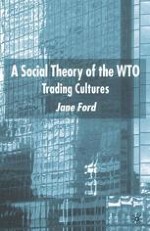2003 | OriginalPaper | Chapter
Re-thinking Power in the Trading Regime
Author : Jane Ford
Published in: A Social Theory of the WTO
Publisher: Palgrave Macmillan UK
Included in: Professional Book Archive
Activate our intelligent search to find suitable subject content or patents.
Select sections of text to find matching patents with Artificial Intelligence. powered by
Select sections of text to find additional relevant content using AI-assisted search. powered by
Developing countries adopted cooperative policies during the Uruguay Round, eroding their traditional identities as the Other in an egoistic trading regime. In adopting disembedded liberal norms, supporting legalism and unilaterally liberalizing during the Uruguay Round, developing countries adopted a new role. In sustaining this over time, they taught this identity to developed countries through representational practices. At the same time, the developing countries learned to see themselves as reciprocal traders. This helped to establish a new collective identity in the trading regime as the boundaries between developing countries and developed countries were re-formed and both groups became part of a Self of multilateral traders. This process represented a change in the regime’s culture from limited multilateralism to deeper multilateralism or superlateralism, based on a collective interest.
